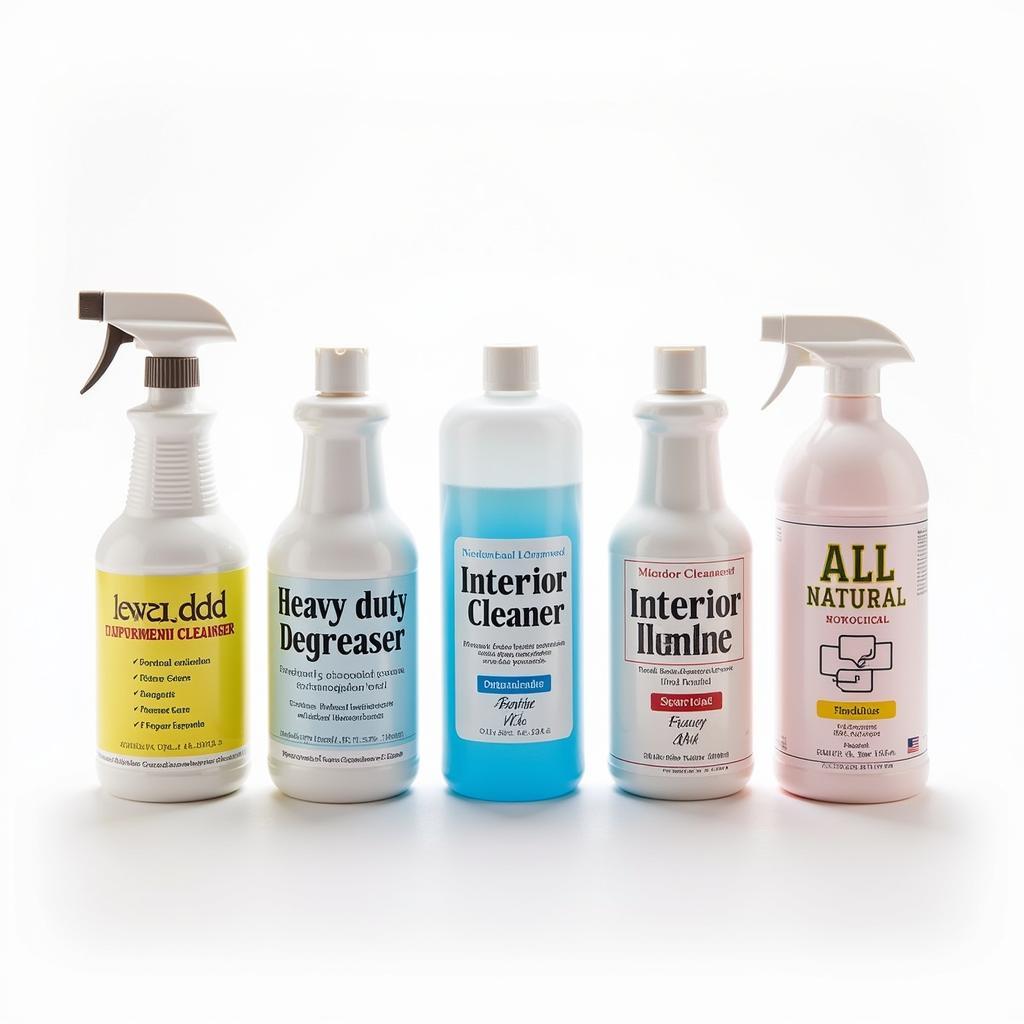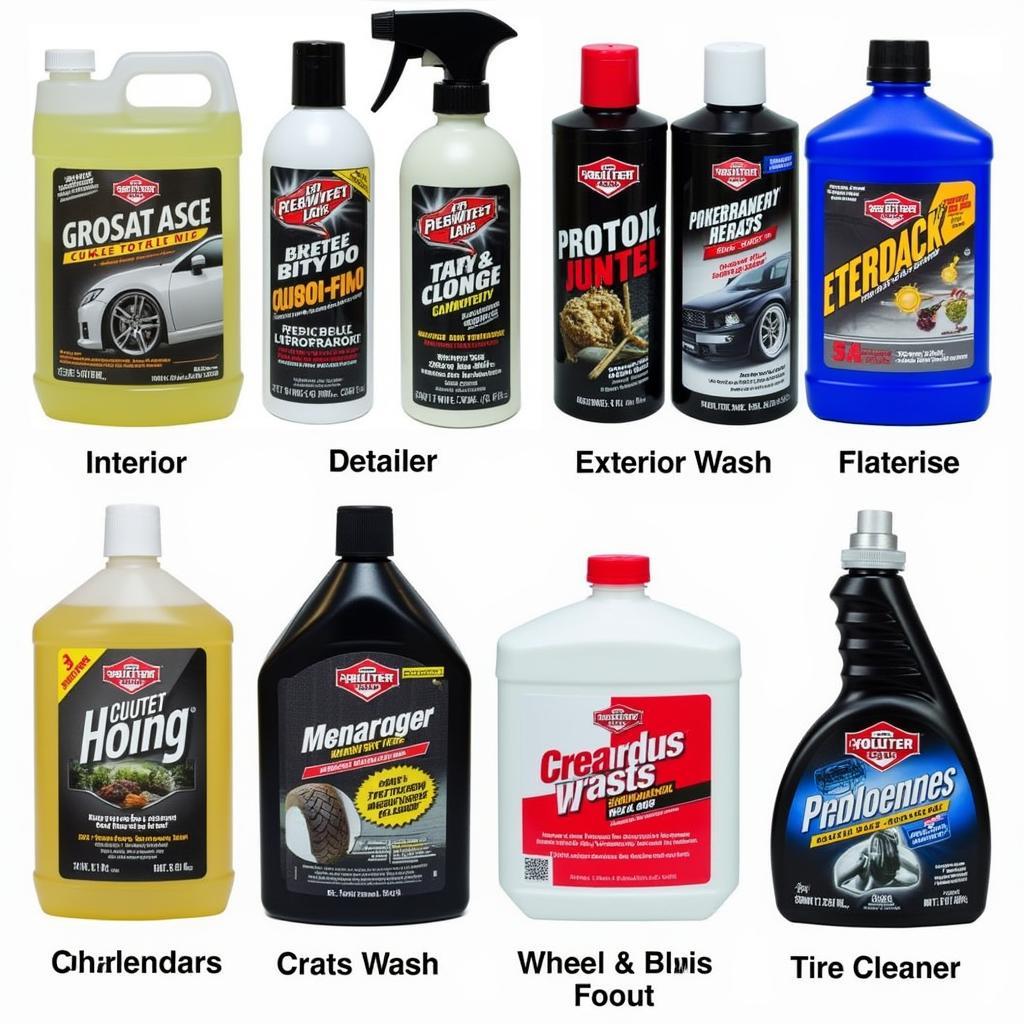All purpose cleaners (APCs) are a staple in many cleaning arsenals, but are they the right choice for your car detailing needs? While the idea of a single product tackling grease, grime, and dirt throughout your car is appealing, using an all purpose cleaner for car detailing requires careful consideration.
Understanding All Purpose Cleaners in Car Detailing
Before we dive in, it’s crucial to understand that not all APCs are created equal. Some are formulated to be gentle, while others are heavy-duty degreasers.
 Types of All Purpose Cleaners
Types of All Purpose Cleaners
The effectiveness and safety of an all purpose cleaner for car detailing depend on several factors:
- Formulation: The ingredients determine whether the cleaner is suitable for paint, leather, vinyl, or fabric.
- Dilution Ratios: APCs are often concentrated, requiring dilution. Using the correct ratio is crucial to prevent damage and ensure effectiveness.
- Intended Use: An APC designed for engine bays might be too harsh for delicate interior surfaces.
The Pros & Cons of Using All Purpose Cleaner for Car Detailing
Let’s weigh the advantages and disadvantages to help you make an informed decision:
Pros:
- Versatility: One product for various cleaning tasks.
- Cost-Effective: Often more affordable than specialized cleaners.
- Availability: Readily available in most stores.
Cons:
- Risk of Damage: Harsh chemicals can strip wax, damage paint, or discolor delicate materials if used incorrectly.
- Limited Effectiveness: May not perform as well as dedicated cleaners on specific surfaces or stains.
- Residue Potential: Improper dilution or rinsing can leave behind streaks or a sticky residue.
When All Purpose Cleaners Can Be Your Car’s Best Friend
Used correctly, an all purpose cleaner can be a valuable asset in your car detailing routine. Here are some situations where they excel:
- Engine Bay Cleaning: A strong APC can cut through grease and grime buildup in the engine bay.
- Tire and Wheel Cleaning: Some APCs are effective at removing brake dust and road grime from tires and wheels.
- Pre-Wash Treatment: Diluted APCs can help loosen dirt and grime before a contact wash.
Expert Insight:
“Always test an APC on an inconspicuous area first, even if it’s marketed as safe for your intended use,” advises Jane Miller, a seasoned car detailing professional with over 15 years of experience. “It’s better to be safe than sorry, especially when working with strong chemicals.”
Choosing the Right All Purpose Cleaner for Your Needs
Navigating the world of APCs can be overwhelming. Here’s what to look for:
- pH Level: A neutral pH (around 7) is generally safe for most car surfaces.
- Ingredients: Avoid harsh chemicals like bleach or ammonia, especially for interior use.
- Dilution Ratios: Opt for cleaners with flexible dilution ratios for different cleaning needs.
Mastering the Art of Using All Purpose Cleaners Safely
To avoid damaging your car, follow these essential tips:
- Read the Label: Always follow the manufacturer’s instructions for dilution and application.
- Start with a Test Spot: Apply the diluted APC to a small, hidden area before using it on a larger scale.
- Work in Sections: Clean one area at a time to prevent the cleaner from drying and leaving streaks.
- Rinse Thoroughly: Remove all traces of the cleaner with plenty of water.
- Dry Immediately: Use a microfiber towel to dry the surface and prevent water spots.
All-Purpose Cleaner Alternatives for Car Detailing
While APCs can be useful, dedicated cleaners often provide superior results and peace of mind, especially for sensitive surfaces. Consider these alternatives:
- Interior Detailers: These are formulated to clean and protect leather, vinyl, plastic, and other interior materials.
- Exterior Washes: Specifically designed for washing and protecting your car’s paint.
- Dedicated Wheel and Tire Cleaners: Offer superior cleaning power for stubborn brake dust and grime.
 Car Detailing Products
Car Detailing Products
FAQs About All Purpose Cleaners in Car Detailing
Can I use an all purpose cleaner on my car’s dashboard?
It depends on the cleaner and the material of your dashboard. Some dashboards are more sensitive than others. Always test on an inconspicuous area first. For the best results and to avoid any risk, consider using a dedicated interior detailer.
What should I do if an all purpose cleaner leaves streaks on my car’s paint?
Try rewashing the area with a car wash soap. If the streaks persist, you may need to use a polish or a paint cleaner to remove them.
Can I use an all purpose cleaner to clean my car’s leather seats?
It’s not recommended. Leather is porous and sensitive. Harsh cleaners can strip away its natural oils, leading to dryness and cracking. Use a dedicated leather cleaner and conditioner for optimal care.
Need Help Choosing the Right Detailing Products?
Navigating the world of car detailing products can feel overwhelming. If you need guidance selecting the best products for your car’s specific needs, don’t hesitate to reach out. You can contact us through WhatsApp at +1(641)206-8880 or email us at [email protected]. Our team of car care experts is available 24/7 to answer your questions and offer personalized recommendations.
Remember, a little knowledge goes a long way in car care. By understanding how to use all-purpose cleaners safely and effectively, you can keep your car looking its best without risking damage.

Leave a Reply